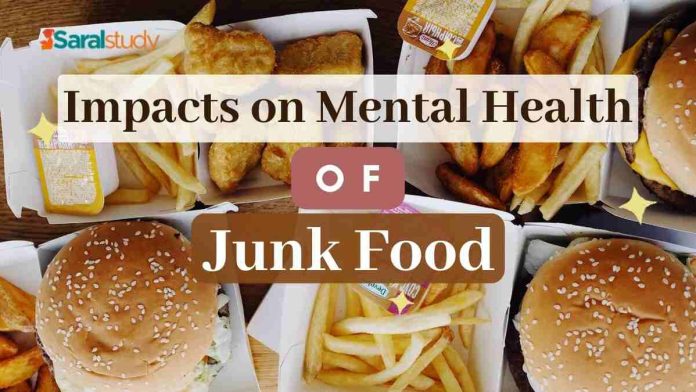In a world where convenience is king, junk food has become a go-to for many. Loaded with fats, sugars, and salts, these quick fixes are tasty but can have serious repercussions on our health. While the physical effects like weight gain are well-known, the impact on mental health, particularly anxiety, is often overlooked. This article delves into how junk food might be contributing to anxiety and what dietary changes can help.
What Exactly is Junk Food?
Junk food includes highly processed items that are calorie-dense but lack essential nutrients. Think fast food, sugary snacks, fried foods, and sodas. They’re often high in unhealthy fats, refined sugars, and excessive salt, making them appealing but harmful in the long run.
Junk Food and Anxiety: What’s the Link?
The foods we consume play a critical role in our mental health. While junk food may be convenient and satisfying in the short term, its long-term effects on anxiety and overall well-being are far from beneficial.
Let’s explore the link between junk food and anxiety, highlighting how our eating habits can affect our mental well-being.
1. High-Fat Diets and Mental Health
Research indicates that diets rich in unhealthy fats, especially trans fats and saturated fats, can harm mental health. These fats can cause inflammation in the body, which has been linked to a higher risk of anxiety and depression. Moreover, high-fat diets can disrupt brain function and neurotransmitter activity, potentially worsening anxiety symptoms.
2. Sugar’s Role in Anxiety
Sugary foods and drinks can cause rapid spikes and drops in blood sugar levels, leading to mood swings and irritability. These fluctuations can make it harder to manage stress and maintain emotional balance, thereby exacerbating anxiety.
3. Lack of Essential Nutrients
Junk food diets often lack essential nutrients like vitamins, minerals, and omega-3 fatty acids, all of which are vital for brain health. A deficiency in these nutrients can impair cognitive function and increase the likelihood of experiencing anxiety.
4. The Gut-Brain Axis
Recent research highlights the significant role of gut health in mental health. A diet high in junk food can disrupt the balance of healthy bacteria in the gut, leading to inflammation and a higher risk of anxiety. This gut-brain connection emphasizes the importance of a balanced diet for mental well-being.
Making Healthier Dietary Choices to Combat Anxiety
By making mindful dietary choices and prioritizing whole, nutrient-rich foods, we can better support our mental health and reduce the risk of anxiety. Remember, a balanced diet is a cornerstone of both physical and mental well-being.
1. Embrace Whole Foods
Whole foods such as fruits, vegetables, whole grains, lean proteins, and healthy fats provide essential nutrients that support brain health. These foods can help stabilize mood and reduce anxiety symptoms.
2. Cut Down on Sugar
Limit sugary snacks and beverages. Opt for natural sources of sweetness, like fruits, and consider alternatives like honey or maple syrup in moderation.
3. Boost Omega-3 Fatty Acids
Omega-3 fatty acids, found in fish, flaxseeds, and walnuts, have anti-inflammatory properties and positive effects on mental health. Incorporate these foods into your diet to help manage anxiety.
4. Stay Hydrated
Dehydration can affect mood and cognitive function. Ensure you drink plenty of water throughout the day to support overall health and mental well-being.
Conclusion
Our food choices significantly impact our mental health. While junk food may offer short-term satisfaction, its long-term effects on anxiety and overall well-being are concerning. By prioritizing whole, nutrient-rich foods and making mindful dietary choices, we can better support our mental health and reduce the risk of anxiety.
FAQs about Junk Food and Anxiety
1. Can junk food really cause anxiety?
- Yes, junk food can contribute to anxiety due to its high content of unhealthy fats, sugars, and lack of essential nutrients, which can affect brain function and mood.
2. What foods should I avoid to reduce anxiety?
- To reduce anxiety, avoid foods high in trans fats, saturated fats, refined sugars, and excessive salt. Processed snacks, fast food, and sugary beverages are common culprits.
3. Are there specific foods that can help reduce anxiety?
- Yes, foods rich in omega-3 fatty acids, whole grains, fruits, vegetables, lean proteins, and fermented foods can help reduce anxiety and support mental health.
4. How quickly can changing my diet impact my anxiety levels?
- While individual responses vary, some people may notice improvements in their anxiety levels within a few weeks of adopting a healthier diet. Consistency is key for long-term benefits.
Understanding the relationship between diet and anxiety can empower us to make better food choices that promote mental health and overall well-being. Remember, what you eat can significantly impact how you feel. Choose wisely for a healthier mind and body.
Read Also: Healthy Diet for Students in Summer


Good blog post. I absolutely love this site.